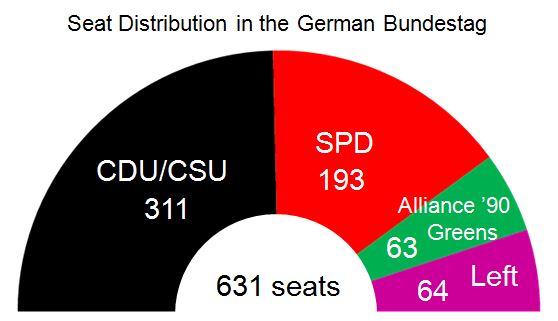Coalition Negotiations: SPD Seeks Party Approval In Germany

Table of Contents
The SPD's Internal Debate: Key Policy Positions and Challenges
Internal divisions within the SPD represent a significant hurdle in the coalition negotiations. Reaching a consensus on key policy positions is essential for presenting a united front to potential coalition partners. The party grapples with differing viewpoints on various crucial issues, potentially leading to protracted debates and compromises.
- Climate Change: The speed of phasing out coal power remains a contentious issue, with some advocating for a faster transition than others. Balancing environmental goals with economic realities is a key challenge.
- Social Welfare: Disagreements exist regarding the level of social spending and the design of social welfare programs. Finding a balance between expanding social safety nets and maintaining fiscal responsibility is a delicate balancing act.
- Economic Policy: Differing views on tax policy, economic growth strategies, and the role of the state in the economy are creating internal tensions. Balancing the needs of different economic sectors and ensuring sustainable growth are critical considerations.
These SPD policy debates highlight the need for internal cohesion, particularly during the demanding process of forging a coalition agreement. The ability of the party leadership to navigate these internal disagreements will significantly impact their ability to negotiate successfully with potential coalition partners.
Potential Coalition Partners and their Demands
The SPD is exploring various coalition options, with the Greens and the Free Democratic Party (FDP) being prominent potential partners. Each party brings its own set of demands and priorities to the table, making the negotiation process particularly challenging.
- Greens: Their key demands center on ambitious climate action, including a rapid phase-out of coal and substantial investments in renewable energy. They also prioritize social justice and environmental protection.
- FDP: The FDP's focus is on fiscal responsibility, deregulation, and a market-oriented economic policy. They prioritize reducing the national debt and limiting government intervention.
The compatibility of these differing agendas presents a major test for Scholz and his negotiation team. Finding common ground on key issues requires a complex strategy of compromise, balancing the needs of different coalition partners and avoiding potential gridlock. Successfully navigating these policy demands will be a crucial determinant of the coalition's success.
The Process of Seeking Party Approval: Methods and Timeline
Securing party approval is a multi-stage process, involving various internal procedures and a defined timeline. This process is vital for the legitimacy and stability of any resulting coalition government.
- Regional Party Meetings: Discussions and debates regarding the potential coalition agreement will take place at the regional level, allowing for widespread party member input.
- National Party Conference Vote: A formal vote on the coalition agreement will be held at a national party conference, potentially involving thousands of delegates.
- Potential for Leadership Challenges: Depending on the outcome of the negotiations and the level of internal support, there’s a possibility of leadership challenges within the SPD.
Potential delays or setbacks could stem from unforeseen disagreements, internal party dissent, or external pressures. This entire party approval process will profoundly impact the timeline of government formation and stability.
Public Opinion and Media Coverage: Impact on Negotiations
Public opinion and media coverage play a crucial role in shaping the SPD coalition negotiations. Public sentiment can influence the SPD's strategy and tactics, while media scrutiny can intensify the pressure on the party leadership.
- Public Support for Coalition Options: Public opinion polls reveal varying levels of support for the different potential coalition scenarios. This information can guide the party’s decision-making process.
- Media Criticism of Negotiation Strategies: The media's role in scrutinizing the negotiations can impact public perception and put extra pressure on the negotiating team.
- Impact of Public Perception on Party Decisions: The SPD is likely to consider public opinion and media narratives as they make critical decisions throughout the negotiation process.
The ongoing media influence and the pressure from public opinion will undoubtedly affect the outcome of the SPD coalition negotiations and shape the future government's policies.
Conclusion: The Future of Coalition Negotiations in Germany
The SPD’s pursuit of party approval for coalition negotiations presents significant challenges, but the successful formation of a stable government is paramount for Germany's future. The internal debates within the SPD, the demands of potential partners, and the external pressures of public opinion and media coverage will all play critical roles in shaping the outcome. The future of German politics rests, in large part, on the successful navigation of these German coalition talks. Stay informed about the developments in SPD government formation and follow this critical process closely.

Featured Posts
-
 Police Complaint To Ofcom Examining The Chris Kaba Panorama Documentary
Apr 30, 2025
Police Complaint To Ofcom Examining The Chris Kaba Panorama Documentary
Apr 30, 2025 -
 Londons Criminal Underworld A Look At The Gangs Of London
Apr 30, 2025
Londons Criminal Underworld A Look At The Gangs Of London
Apr 30, 2025 -
 Chainalysis Acquisition Of Alterya A Strategic Move In Ai Powered Blockchain Analysis
Apr 30, 2025
Chainalysis Acquisition Of Alterya A Strategic Move In Ai Powered Blockchain Analysis
Apr 30, 2025 -
 The End Of An Era A Shocking Exit For A Coronation Street Icon
Apr 30, 2025
The End Of An Era A Shocking Exit For A Coronation Street Icon
Apr 30, 2025 -
 Independent Office For Police Conduct Iopc Challenges Bbcs Chris Kaba Documentary
Apr 30, 2025
Independent Office For Police Conduct Iopc Challenges Bbcs Chris Kaba Documentary
Apr 30, 2025
